Nikhil Prasad Fact checked by:Thailand Medical News Team Nov 25, 2024 1 year, 2 months, 2 weeks, 4 days, 22 hours, 23 minutes ago
Herbs And Phytochemicals: Researchers from “Victor Babeș” National Institute of Pathology, SC Hofigal Export-Import SA, and Titu Maiorescu University in Romania have unveiled groundbreaking findings on the effects of Trifolium pratense, commonly known as red clover, on breast cancer. These in vitro studies highlight the dual nature of red clover extracts in combating and, intriguingly, promoting cell growth under specific conditions.
 Breast cancer research highlights the biphasic effects of Red Clover extracts
Breast cancer research highlights the biphasic effects of Red Clover extracts
This
Herbs And Phytochemicals news report sheds light on how two red clover extracts interact with different breast cell types, including normal, estrogen receptor-positive (ER+), and estrogen receptor-negative (ER−) cancer cells, offering insights into their potential therapeutic applications.
The Study at a Glance
The study explored the biological effects of aqueous and ethanolic red clover extracts on breast cancer cell lines. These extracts were tested across a wide range of concentrations (0.1 to 3.33 mg/mL) to evaluate their influence on cell viability, proliferation, and oxidative stress. The researchers observed a hormetic, or biphasic, response, where low concentrations enhanced cell growth while higher concentrations exhibited cytotoxicity.
Notably, the ethanolic extract demonstrated a stronger dose-dependent effect on highly invasive ER− adenocarcinoma cells. It caused significant oxidative stress and apoptosis, while the aqueous extract showed selective toxicity towards cancer cells, sparing normal ones. The study also highlighted the role of reactive oxygen species (ROS) in the extracts' cytotoxic effects.
Key Findings: A Complex Dual Role
-Proliferation and Cytotoxicity:
Ethanolic Extract (Tp-eth): At its highest concentration, it was most effective in reducing the viability of ER− cancer cells, showcasing its potential as an anticancer agent. However, at lower doses, it slightly stimulated the growth of ER+ cells.
Aqueous Extract (Tp-aq): Exhibited selective toxicity, affecting cancer cells more than normal ones. At low concentrations, it enhanced the proliferation of both ER+ cancer cells and non-cancerous cells.
-Oxidative Stress Mechanism:
The ethanolic extract generated ROS, which led to mitochondrial dysfunction and apoptosis in ER− cells. This pro-oxidant activity, while damaging to cancer cells, raises questions about its long-term safety for normal cells.
-Antioxidant Potential:
Both extracts showed significant antioxidant activity in chemical assays, though the ethanolic extract outperformed the aqueous one. This antioxidant capacity is linked to the high levels of polyphenols, flavonoids, and isoflavones found in red clover.
-Isoflavone Content:
The study identified four key isoflavones - formononetin, biochanin A, daidzein, and genistein. These compounds are known for their estrogenic and antioxidant properties, which may explain the extracts' varying effects on ER+ and ER- cells.
Implications for Breast Cancer Therapy
The findings underscore the therapeutic potential of red clover extracts in managing breast cancer, particularly for ER- subtypes, which are often more aggressive and harder to treat. However, the biphasic response and the differential effects based on estrogen receptor status highlight the need for careful dose optimization.
The study also emphasizes the complexity of using plant-based compounds in medicine. While their natural origin offers a wealth of bioactive molecules, these compounds can exhibit both beneficial and adverse effects depending on the context.
Conclusions
This research provides compelling evidence of red clover's potential as a chemopreventive agent. The extracts’ ability to modulate cell proliferation and induce apoptosis in cancer cells positions them as promising candidates for further investigation. However, their hormetic effects - stimulating growth at low doses and inducing cytotoxicity at high doses - call for a cautious approach.
For clinical application, more in-depth studies, including in vivo experiments and clinical trials, are essential. Understanding the precise mechanisms behind the extracts' biphasic effects and their interaction with different breast cancer subtypes will be critical in developing safe and effective treatments.
The study findings were published in the peer-reviewed journal: Antioxidants.
https://www.mdpi.com/2076-3921/13/12/1435
For the latest on
Herbs and Phytochemicals, keep on logging to Thailand Medical News.
Read Also:
https://www.thailandmedical.news/news/new-study-links-glucocorticoid-receptor-types-to-breast-cancer-outcomes,-paving-the-way-for-personalized-treatments
https://www.thailandmedical.news/news/breast-cancer-rates-rising-among-younger-women
https://www.thailandmedical.news/news/australian-scientists-warn-of-rising-advanced-breast-cancer-cases-in-the-current-covid-19-era
